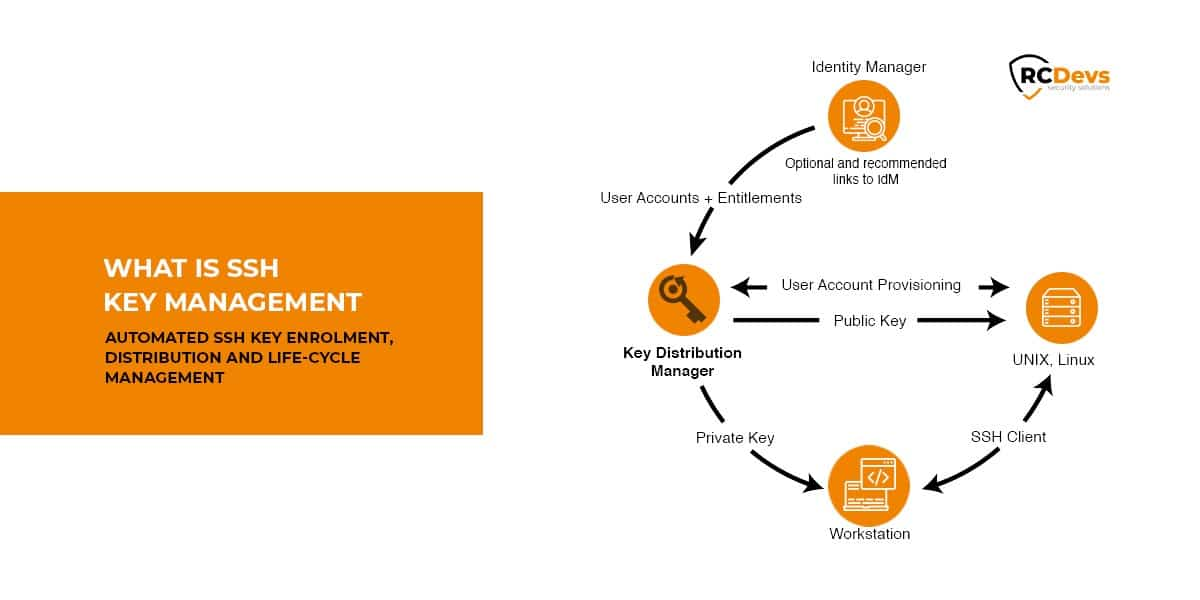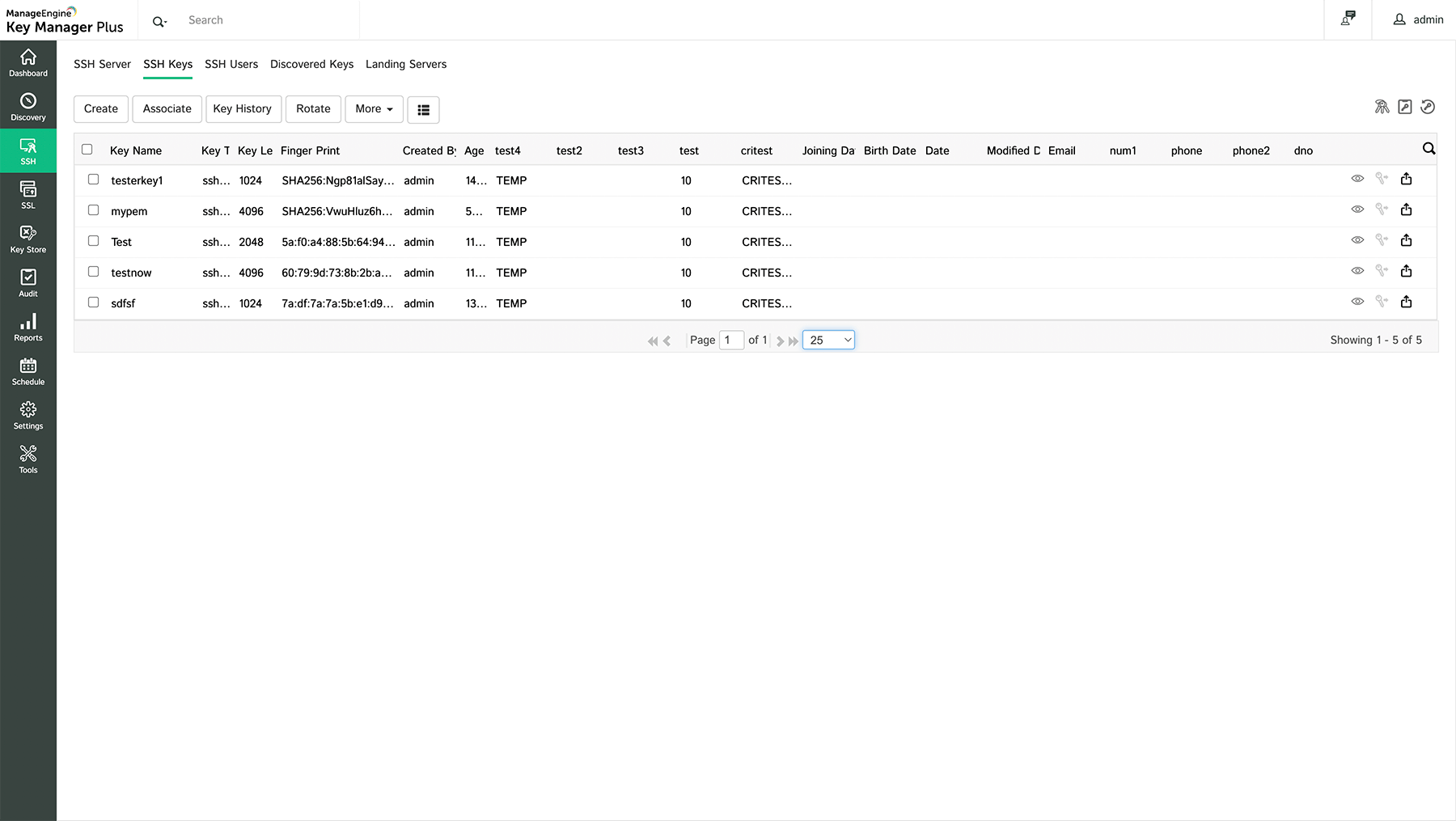Mastering The Best SSH Key Management For Ultimate Security
Let's face it, folks. In today's digital world, security is king, and SSH key management plays a vital role in keeping your systems safe and sound. Whether you're a tech-savvy guru or a newbie trying to wrap your head around cybersecurity, understanding how to manage SSH keys properly is a game-changer. But here's the kicker—it's not just about setting up SSH keys and calling it a day. It's about mastering the best practices that keep your digital fortress impenetrable.
You might be thinking, "Why all the fuss about SSH key management?" Well, buckle up because I'm about to spill the tea. SSH keys act as digital passports for secure communication between your computer and servers. If you don't manage them right, you're basically handing over the keys to your digital kingdom to potential hackers. And trust me, no one wants that.
Now, before we dive headfirst into the nitty-gritty of SSH key management, let me paint you a picture. Imagine this: you're running a business, and your team needs secure access to sensitive data. Without proper SSH key management, you're leaving the door wide open for unauthorized access. Scary, right? That's why we're here—to equip you with the knowledge and tools to manage SSH keys like a pro.
- Pepper 0 Family The Ultimate Guide To Exploring Their Origins Legacy And Fascinating World
- Colorado Unemployment 1099g A Mustread Guide For Every Taxpayer
Understanding SSH Key Management
What is SSH Key Management Anyway?
Alright, let's break it down. SSH key management is essentially the process of creating, storing, and maintaining SSH keys to ensure secure access to your servers. Think of it as a digital keychain where you keep all your keys organized and secure. But here's the thing—it's not just about having a keychain; it's about making sure each key is strong, unique, and protected.
SSH keys come in pairs: a public key and a private key. The public key is like a lock that you can share with others, while the private key is the actual key that unlocks it. The magic happens when these two work together to create a secure connection. But if someone gets their hands on your private key, well, let's just say it's not gonna be pretty.
Why is SSH Key Management Important?
Here's the deal—SSH key management isn't just some fancy tech term; it's a crucial component of your overall security strategy. Without proper management, you're risking unauthorized access, data breaches, and a whole lot of headaches. And let's be real, no one has time for that.
- Alice Rosenbaum Onlyfans Leak The Untold Story You Need To Know
- Deep Hot Lonk Unveiling The Hidden Depths Of A Trending Topic
Now, imagine this scenario: you've got a team of developers working on a project, and each one has their own SSH key. If one of those keys gets compromised, your entire system could be at risk. That's why having a solid SSH key management strategy is non-negotiable. It's like putting a lock on every door and making sure only the right people have the keys.
Best Practices for SSH Key Management
1. Use Strong and Unique Keys
Let's talk about the foundation of SSH key management—creating strong and unique keys. Gone are the days when you could get away with using weak passwords. When it comes to SSH keys, you want to make sure they're as strong as Fort Knox. Use algorithms like RSA or ECDSA with a key size of at least 2048 bits. And don't forget to add a passphrase to your private key for an extra layer of security.
Here's a quick tip: avoid reusing keys across multiple systems. Each system should have its own unique key pair. It's like having a different lock for each door in your house. Sure, it might seem like a hassle, but trust me, it's worth it in the long run.
2. Store Keys Securely
Now that you've got your strong and unique keys, it's time to talk about storage. Keeping your SSH keys secure is paramount. Use encrypted storage solutions like SSH agents or hardware security modules (HSMs) to protect your private keys. And never, ever store your private keys in plain text. That's just asking for trouble.
Also, make sure to restrict access to your keys. Only the people who absolutely need them should have access. It's like keeping your wallet in a safe place—don't leave it lying around where anyone can grab it.
3. Regularly Rotate Keys
Here's a golden rule of SSH key management—regularly rotate your keys. Just like you change your passwords every now and then, you should also rotate your SSH keys. This ensures that even if a key gets compromised, the damage is limited. Set up a schedule to review and rotate your keys at least once a year. And while you're at it, revoke any unused or outdated keys.
Think of it like changing the locks on your house every few years. Sure, it might seem like overkill, but it's a small price to pay for peace of mind.
Common Mistakes in SSH Key Management
1. Using Weak Keys
One of the biggest mistakes people make is using weak SSH keys. It's like leaving your front door unlocked and hoping no one notices. Weak keys are easier to crack, making your system more vulnerable to attacks. Always use strong algorithms and key sizes to ensure maximum security.
2. Storing Keys Insecurely
Another common mistake is storing SSH keys insecurely. Whether it's leaving them in plain text files or sharing them via email, insecure storage is a recipe for disaster. Always use encrypted storage solutions and restrict access to your keys.
3. Not Rotating Keys
And last but not least, not rotating keys is a major no-no. If you're using the same keys for years, you're increasing the risk of a breach. Regularly rotating your keys ensures that even if one gets compromised, the damage is limited. So, don't be lazy—set up a schedule and stick to it.
Tools for SSH Key Management
1. OpenSSH
When it comes to SSH key management tools, OpenSSH is a classic choice. It's open-source, widely used, and offers a range of features for managing SSH keys. With OpenSSH, you can easily generate, store, and manage your keys. Plus, it's compatible with most systems, making it a versatile option for both beginners and experts.
2. HashiCorp Vault
Another popular tool for SSH key management is HashiCorp Vault. It's a powerful solution that offers secure storage and access control for your keys. Vault allows you to manage secrets, including SSH keys, and provides features like key rotation and access auditing. If you're looking for a more advanced tool, HashiCorp Vault is definitely worth considering.
3. CyberArk
For enterprises that require enterprise-grade security, CyberArk is a top contender. It offers a comprehensive solution for managing SSH keys across large-scale environments. With features like automated key rotation and centralized management, CyberArk helps streamline the SSH key management process for businesses of all sizes.
SSH Key Management in the Cloud
Cloud-Based Solutions
With the rise of cloud computing, managing SSH keys in the cloud has become increasingly popular. Cloud-based solutions offer scalability, flexibility, and ease of use. Platforms like AWS Secrets Manager, Azure Key Vault, and Google Cloud Secret Manager provide robust tools for managing SSH keys in the cloud. They offer features like automatic key rotation, access control, and audit logging, making it easier to manage keys across multiple environments.
Benefits of Cloud-Based SSH Key Management
So, why should you consider cloud-based SSH key management? For starters, it offers centralized management, which makes it easier to monitor and control access to your keys. Plus, cloud-based solutions often come with built-in security features like encryption and access control, ensuring your keys are protected. And let's not forget the convenience of being able to access your keys from anywhere with an internet connection.
SSH Key Management for Teams
Collaboration and Access Control
When it comes to managing SSH keys for teams, collaboration and access control are key. You want to make sure that only the right people have access to the right keys. Use tools like SSH agents or centralized key management systems to streamline the process. And don't forget to set up proper access controls to ensure that sensitive keys are only accessible by authorized personnel.
Best Practices for Teams
Here are some best practices for SSH key management in a team setting:
- Use unique keys for each team member
- Set up role-based access control
- Regularly review and rotate keys
- Monitor access logs for suspicious activity
- Provide training and guidelines for secure key management
Future Trends in SSH Key Management
1. Automation
As technology continues to evolve, automation is becoming a key trend in SSH key management. Tools that offer automated key generation, rotation, and revocation are becoming increasingly popular. Automation not only saves time but also reduces the risk of human error, ensuring your keys are always up to date and secure.
2. Machine Learning
Machine learning is also making waves in the world of SSH key management. By analyzing patterns and behaviors, machine learning algorithms can detect potential security threats and alert you before they become a problem. This proactive approach to security is a game-changer for businesses looking to stay ahead of the curve.
3. Quantum Computing
And finally, quantum computing is on the horizon, and it's set to revolutionize the way we manage SSH keys. Quantum-resistant algorithms are being developed to ensure that even with the advent of quantum computing, your keys remain secure. While it may seem like science fiction, quantum computing is a real threat that we need to start preparing for today.
Conclusion
In conclusion, mastering the best SSH key management practices is essential for keeping your systems secure in today's digital landscape. By understanding the importance of SSH key management, implementing best practices, and leveraging the right tools, you can ensure that your digital fortress remains impenetrable.
So, here's the deal—don't be the person who regrets not taking SSH key management seriously. Take action today, implement these best practices, and protect your systems from potential threats. And remember, security is a team effort. Share this article with your colleagues, leave a comment, and let's start a conversation about SSH key management. Together, we can make the digital world a safer place.



Detail Author:
- Name : Patience Greenfelder
- Username : chester.zemlak
- Email : maegan38@hintz.info
- Birthdate : 1973-05-07
- Address : 457 Hansen Way Eleazarbury, OK 89759
- Phone : +1-562-669-1868
- Company : Nicolas Ltd
- Job : Tree Trimmer
- Bio : Sed suscipit eos amet vero at eligendi. Aut iusto quisquam distinctio voluptates at et molestias dignissimos. Ut omnis optio eum repudiandae modi animi. Mollitia et quo eos fugit ipsam aut.
Socials
linkedin:
- url : https://linkedin.com/in/rickcrona
- username : rickcrona
- bio : Aut distinctio et enim molestiae.
- followers : 5895
- following : 2772
twitter:
- url : https://twitter.com/rick2002
- username : rick2002
- bio : Quia expedita dicta alias tempora laboriosam excepturi. Commodi veritatis praesentium quis fuga. Possimus autem autem neque laborum laborum.
- followers : 5611
- following : 1797
tiktok:
- url : https://tiktok.com/@rick_official
- username : rick_official
- bio : Vero aliquam officiis quo assumenda maxime. Explicabo unde modi omnis ex nam.
- followers : 4453
- following : 604
instagram:
- url : https://instagram.com/rcrona
- username : rcrona
- bio : Tenetur cumque ab quisquam et nihil eum aut. Et nulla dolor placeat ut aut aut eos.
- followers : 3176
- following : 730